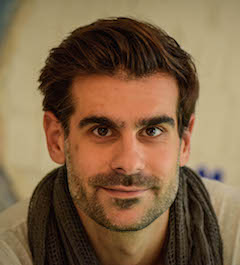 Boris Martinović
Boris Martinović
Head of Mergers Section
Hungarian Competition Authority
Young Leaders Program (’15)
Please tell us about your career path so far. What is your area of specialization and how did you come to work in this area?
I specialize in competition policy and competition law enforcement, both in antitrust and mergers. I received my Master Degree in Finance in 2008 and soon after started working for the Hungarian Competition Authority on cases and issues related to financial markets. I’ve worked for the authority ever since, acquiring knowledge and expertise in various fields of competition policy.
You are currently working as Head of Section in the Hungarian Competition Authority. What are your main roles and responsibilities?
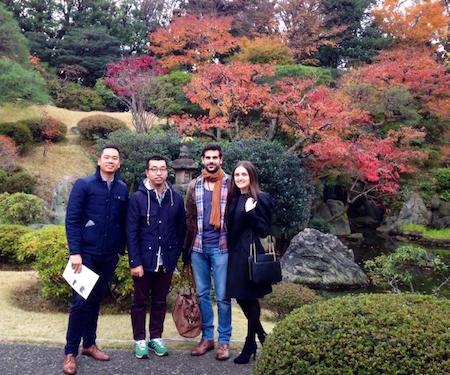
Enjoying the beautiful autumn folliage with GRIPS batchmates
My main responsibility is managing the work of the authority’s Merger Section, which deals with competitive assessment of mergers between undertakings with effect on various Hungarian markets. I supervise a team of 6 people, and we deal with approximately 50-60 merger cases per year.
In your current capacity, what do you see as the main opportunities and challenges for Hungary over the course of the next five to ten years?
The main opportunity I see is the capability and ability to attract and make use of foreign investments, increasingly so from Asian countries, in order to establish a diverse and competitive, open economy. One of the main challenges is the outflow of skilled workforce and the ensuing lack of high quality human resources at the domestic companies.
What are some of the biggest challenges you face in your work? And what have been the most interesting or rewarding aspects of your career thus far?
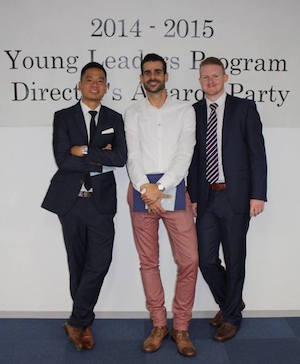
Boris, a proud recipient of the YLP Director’s Award
The biggest challenge is the quantity of merger cases paired with extremely short deadlines that we face. Ensuring proper and effective competitive assessment of merger in these circumstances is a difficult task. A rewarding aspect of my career is the fact that through competition law enforcement the Hungarian Competition Authority has been able to contribute to significant, quantifiable benefits for consumer and undertakings alike. Also, managing tough, complex, intellectually challenging cases of competition law and economics is a challenge, but at the same time a great satisfaction when accomplished.
What led you to GRIPS? What is the most important thing you got out of your studies here, and how has your experience at GRIPS prepared you for future endeavours?
What led me to GRIPS was on one hand the desire to explore Japan and its culture, and on the other hand my wish to become a more prepared and skilled leader in the public sector. Apart from the valuable lessons I learned through courses and discussions at GRIPS, and apart from the amazing overall experience of Japan, the main concept and idea (and also skill) I learned about (in general and within myself) was “tolerance”. Being part of a greatly diverse community like the one present at GRIPS, and especially in a foreign country, makes one learn a lot about tolerance, which is something we all need to harness in the globalized world we live in today.
What are some of your fondest memories of your time spent at GRIPS? And what do you miss about Japan?
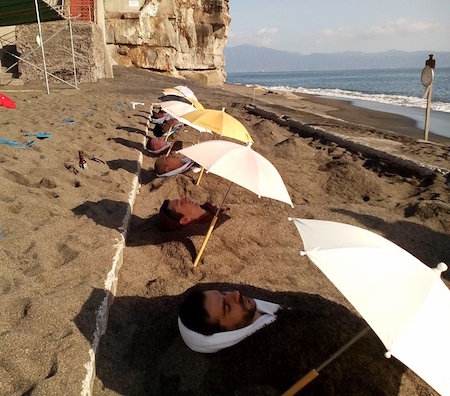
Relaxing at the Ibusuki ‘sunamushi’ sand bath during a field trip to Kagoshima prefecture with YLP fellows.
My fondest memories are the field trips we had together with my classmates, and the various other trips I made with my friends and also by myself. I miss the overall cultural experience, the food and festivals, the 24/7 “madness” of Tokyo, and the beautiful nature of Japan.
You are running a blog “Imagining Japan” that combines fictitious stories with photographs of real people, places and objects. Please tell us more about your blog.
During my stay in Japan I made many photos of people – I did street photography to categorize it somehow. Also, while in Japan, I realized my true passion in life is writing, more precisely writing fiction. I wrote several short stories while in Japan, and somehow it became obvious to me that I should try combining my photography with my stories. Probably also because my writing style is very visual, I use visually strong pictures, therefore combining it with real, existing pictures (like photos) comes naturally. Also, I want to make people think about important issues in society and life, and the impact of the messages is stronger with visual components to them. You can follow my blog here: www.imaginingjapan.com, www.facebook.com/imaginingjapan/.
And you have just published a novel, inspired by your experience in Japan, too. Please tell us all about it.
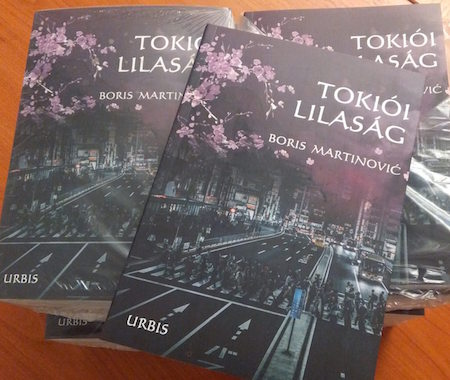
Boris’ debut novel “Tokioi Lilasag”, or “Tokyo Purpleness”, was published in November 2017.
Yes. As I mentioned, I wrote several short stories while staying in Japan. Somehow, these stories seemed to want to climb out of the tight boundaries of a typical short story, longing, almost screaming for more space, more pages. My editor also told me that my style was more suited for a novel rather than short fiction, and one of these shorts just started growing and growing into a proper novel.
I started writing it in April 2016, several months after returning from Japan, and I finished the manuscript a year later, in April 2017. The story runs on two timelines: in modern day Tokyo and in a small town called Saijo (near Hiroshima) during WWII. It’s a novel analyzing the issues of “accepting” and “letting go”, so it’s very personal, but the style and setting is very Japanese, with a lot of Japanese culture, traditions and even spirituality involved. I would even describe it magical – let’s say magical realism, maybe in the footsteps of Murakami (my favorite writer, by the way).
There is various content accompanying the novel – a blog, a facebook page, an Instagram page, etc. -, but everything is available only in Hungarian. However, my goal is to have an English translation by next Spring, so everyone can read it. I’ll let you know!
If you could give one piece of advice to anyone considering studying at GRIPS what would it be?
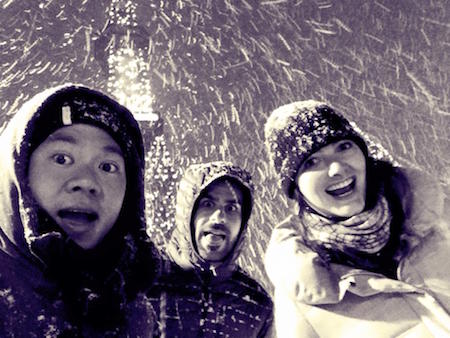
Caught in a snowstorm during the Snow Festival in Sapporo, Hokkaido.
Oh, that’s easy! Don’t hesitate and embrace this amazing opportunity! The cultural experience is indescribable and it enriches you at so many levels! My most important advice would be to be open-minded and tolerant, and you will have the time of your life in exchange.
How would you like to maintain involved with the School? What do you expect from GRIPS as an alumnus and do you have any suggestions on how to further utilize the GRIPS alumni network?
My suggestion would be to make it possible for alumni to come back to GRIPS and teach short courses (in the Summer Program for example), or give lectures or presentations in some form. On my behalf I would be more than happy to make a short introductory course on competition policy as I consider this a very important field of public policy which currently is not being thought at GRIPS at all. I’m on standby! :-)





